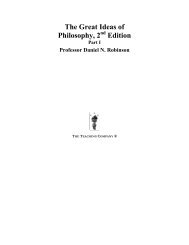English idioms in the first language and second language lexicon: a ...
English idioms in the first language and second language lexicon: a ...
English idioms in the first language and second language lexicon: a ...
You also want an ePaper? Increase the reach of your titles
YUMPU automatically turns print PDFs into web optimized ePapers that Google loves.
332 <strong>English</strong> <strong>idioms</strong> <strong>in</strong> <strong>the</strong> L1 <strong>and</strong> L2 <strong>lexicon</strong><strong>the</strong> position of <strong>the</strong> idiomatic key with<strong>in</strong> <strong>the</strong> configuration,process<strong>in</strong>g time may vary. This fact could not be expla<strong>in</strong>ed by <strong>the</strong>‘<strong>first</strong> generation’ hypo<strong>the</strong>ses <strong>and</strong> makes <strong>the</strong> Configuration Modelsuperior to <strong>the</strong>m.The four process<strong>in</strong>g hypo<strong>the</strong>ses discussed so far were developedbefore Gibbs <strong>and</strong> his colleagues (Gibbs <strong>and</strong> Nayak, 1989; Gibbs,Nayak <strong>and</strong> Cutt<strong>in</strong>g, 1989; Gibbs, Nayak, Bolton <strong>and</strong> Keppel, 1989)<strong>in</strong>troduced <strong>the</strong> Idiom Decomposition Hypo<strong>the</strong>sis, which has<strong>in</strong>itiated detailed research on <strong>the</strong> construct of decomposability <strong>and</strong>has helped authors of subsequent studies to systematically control<strong>the</strong>ir material, thus improv<strong>in</strong>g <strong>the</strong>ir results. Lack of this controlmight be one reason why <strong>the</strong> results of <strong>the</strong> four hypo<strong>the</strong>sesdiscussed above are very heterogeneous <strong>and</strong> difficult to compare.Gibbs <strong>and</strong> his colleagues started to systematically control an idiom’sdegree of decomposability (Gibbs <strong>and</strong> Nayak, 1989; Gibbs, Nayak<strong>and</strong> Cutt<strong>in</strong>g, 1989; Gibbs, Nayak, Bolton <strong>and</strong> Keppel, 1989), an ideathat goes back to Nunberg (1978; see also Wasow et al., 1982;Nunberg et al., 1994). Although often cited as such, <strong>the</strong> IdiomDecomposition Hypo<strong>the</strong>sis is not an assumption about <strong>the</strong>process<strong>in</strong>g of <strong>idioms</strong>; decomposability is an <strong>in</strong>fluenc<strong>in</strong>g variablewith regard to comprehension or representation (Gibbs, Nayak <strong>and</strong>Cutt<strong>in</strong>g, 1989). First of all, it is a hypo<strong>the</strong>sis about <strong>the</strong> analysabilityof <strong>idioms</strong>: ‘speaker’s assumptions about how <strong>the</strong> mean<strong>in</strong>g of <strong>the</strong>parts contribute to <strong>the</strong> figurative mean<strong>in</strong>gs of <strong>the</strong> whole’ (Gibbs<strong>and</strong> Nayak, 1989: 104). A decomposable idiom is an idiom whose<strong>in</strong>dividual components contribute to its figurative mean<strong>in</strong>g. Idiomswhose <strong>in</strong>dividual constituents do not make such a contribution arenondecomposable. Note that decomposability is a feature of <strong>idioms</strong>that is based on speakers’ judgements <strong>and</strong> is <strong>the</strong>refore relevantfrom a psychol<strong>in</strong>guistic po<strong>in</strong>t of view, whereas compositionality – anotion often wrongly used synonymously with it – is a <strong>the</strong>oreticalassumption about <strong>the</strong> comb<strong>in</strong>ation of syntactic constituents <strong>and</strong><strong>the</strong>ir phrasal or sentential mean<strong>in</strong>gs, which is important with<strong>in</strong>l<strong>in</strong>guistic <strong>the</strong>ories such as generative grammar. 2 From a generative,syntactic po<strong>in</strong>t of view, only <strong>the</strong> literal mean<strong>in</strong>g of an idiom iscompositional, while <strong>the</strong> figurative mean<strong>in</strong>g is always noncompositional.Therefore, decomposable <strong>idioms</strong> can be partly2The compositionality pr<strong>in</strong>ciple, which goes back to Frege <strong>and</strong> holds that <strong>the</strong> ‘mean<strong>in</strong>g of anexpression is a function of <strong>the</strong> mean<strong>in</strong>gs of its parts <strong>and</strong> of <strong>the</strong> way <strong>the</strong>y are syntacticallycomb<strong>in</strong>ed’ (Partee, 1984: 281) is a basic assumption of generative grammar. It is responsiblefor <strong>the</strong> great problems that <strong>idioms</strong> pose with<strong>in</strong> this framework <strong>and</strong> is <strong>the</strong> reason whygenerative grammarians have proposed various, complex assumptions for <strong>the</strong> description ofidiomatic expressions. These assumptions were <strong>in</strong>tended to make <strong>idioms</strong> fit <strong>in</strong>to <strong>the</strong> overallcompositional pattern (e.g., Katz <strong>and</strong> Postal, 1963; We<strong>in</strong>reich, 1969; Fraser, 1970; Katz, 1973;Everaert, 1993; Schenk, 1995; van Gestel, 1995).Downloaded from http://slr.sagepub.com at Shanghai Jiaotong University on March 7, 2009














